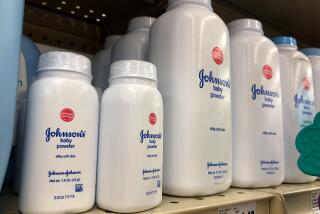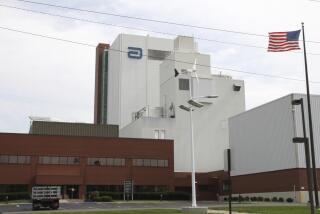Phony Baby Formula Proves Tragic for Many Poor Chinese
- Share via
FUYANG, China — When Yang Kaili was born in January, her mother wasn’t able to breast-feed her, so the baby was given Star of the Grasslands baby milk powder. “We don’t really have enough to eat,” mother Qiu Fang said, “so I can’t produce milk.”
By February, Kaili’s head had started to puff up. Her skin turned bright red and glossy, and her eyes were reduced to slits. What the family initially thought were healthy signs of her gaining weight was actually their daughter’s tiny, malnourished body screaming out for help. It turned out that several brands of infant formula sold in their province in central China were fake and contained almost no nutritional value.
Although Kaili’s parents switched brands after learning about the counterfeit formula last month and she is slowly recovering, brain damage over the longer term remains a concern.
“We’re very angry,” Qiu said. “We’re very worried.”
Wu Defen, 27, wasn’t so lucky. Anticipating that she would have to go to work in the city immediately after her son was born and wouldn’t be able to breast feed, she unwittingly fed him the fake formula. Within a month, he was dead.
“He was so young when he died, we didn’t even have time to take a picture,” Wu said.
China is known worldwide for exporting knockoffs ranging from CDs and pharmaceuticals to aircraft parts and toothpaste. Less well known is its huge corresponding domestic problem, with often-tragic consequences for its people.
The milk powder case also underscores the gap between China’s savvy city dwellers and its sea of poorly educated rural citizens with little understanding of their rights.
“I don’t know about suing anyone,” said Kaili’s father, Yang Dengjun, 40, a farmer whose education extends through elementary school. “And we don’t have the money to do it anyway.”
The Fuyang government has offered $1,200 to families that lost a child and has agreed to cover medical care for any seriously malnourished children. It’s banned sales by 45 companies and publicized the seizure of 21,912 bags of fake milk powder, which many bought because at around $1.20 it was significantly cheaper than the real thing.
Critics point out that the same local government certified the milk powder’s nutritional value, even as it ignored complaints of infant deaths and related illnesses for months -- until the scandal finally caught Beijing’s attention.
“The local government absolutely knew what the companies were doing,” said a Fuyang official, who requested anonymity out of concern he’d lose his job. “The companies bribed the local industrial standards bureau for permits. In the end, it comes down to just one word: corruption.”
A Fuyang official in the city’s propaganda department who also would not give his name declined to respond to such allegations, citing an ongoing inquiry.
Asked how the companies got permits in the first place, however, he responded: “It happens everywhere -- in Beijing, Guangdong, all over the place. Why single us out?”
Officially, 13 babies died and more than 170 suffered serious malnutrition as a result of drinking the fake milk powder. The toll’s almost certainly far higher, locals say. The milk powder packets have been sold locally for nearly two years, they add, resulting in untold numbers of deaths before angry residents finally made the link.
This is a region where impoverished farmers can go for years, even a lifetime, without seeing a doctor. “Whether it’s fake milk powder or fake seeds, which hits them even harder, China’s farmers are often the victims,” said Sun Heng, head of a civic group called Farmer’s Friend. “It’s not their fault, although they’re often blamed. They don’t know any better. Society needs to strengthen their education and legal rights.”
The milk powders were sold under a host of prosaic-sounding brand names, including Flying Bear, Good Baby and Flying Deer. Wu, the mother who lost her baby, recalls feeling comforted by the TV ad campaign for Golden Partner milk powder showing fat, healthy babies.
“I naturally assumed my baby would be well fed by drinking it as well,” she said. “These companies are criminal.”
An analysis has found the actual ingredients to be starch, flour and sugar.
The scandal has revealed some of the hard choices made by poor families, in a society in which boys are still heavily favored and there’s rarely enough to go around.
When Wei Pengzhen had twins seven months ago, she barely had enough breast milk for one child. So she gave her milk to her son, Heiyang, and fed the milk powder to her daughter, Heixia. Now Heixia is being nursed back from the brink of death, nearly six pounds lighter than her brother.
The central government has launched an investigation at the request of Premier Wen Jiabao. There’s more than enough blame to go around. More than 30 people have been detained on suspicion of producing or selling the powder, with two Fuyang officials suspended. Locals, however, say they expect most to quietly return to work after the furor dies down.
Efforts to reach several of the companies, which list their headquarters in such remote provinces as Heilongjiang, Inner Mongolia and Xinjiang, were unsuccessful. In a sign of the lax oversight plaguing the food industry, investigators still can’t locate 20 of the 45 producers.
Wang Hai, head of the Anti-Fraud Organization, a civic group fighting fakes and knockoffs, said this was not the first deadly scandal, nor would it be the last. In recent years, Chinese consumers have been killed by poisonous rice, poisonous cooking oil, fake medicines, fetid meat and poisonous wine. “This is just a small corner of a large iceberg,” Wang said.
China’s move from socialist planning to a market economy has left huge gaps in government oversight, analysts say.
The nation’s consumer movement also remains in its infancy, closely watched by a government concerned that any nascent organization might challenge it politically. And local officials are often promoted on the basis of what impresses their bosses, not what meets the needs of average citizens.
“The Communist Party is good,” said Wei Lujian, 70, the grandfather of twins Heixia and Heiyang. “But the individuals these days are so greedy and obsessed with making money. In Mao’s day, this never would have happened.”
*
Yin Lijin of The Times’ Beijing Bureau contributed to this report.
More to Read
Sign up for Essential California
The most important California stories and recommendations in your inbox every morning.
You may occasionally receive promotional content from the Los Angeles Times.












